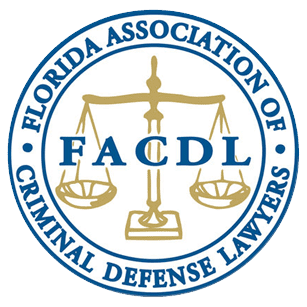Getting charged with any kind of DUI can have lasting effects, from social stigma to losing your driver’s license. You shouldn’t have to handle this situation alone.
Attorney Erika Valcarcel has years of experience in court and has helped countless clients with their DUI charges. She can help you work towards getting charges dropped or reduced, or she might be able to negotiate a plea deal that saves you from extreme penalties.
Call (941) 363-7900 to get your DUI defense started with a free consultation with an experienced criminal lawyer in Sarasota, FL.
Florida DUI Laws
Florida Statute §316.193 defines a DUI as driving or being in actual physical control of a vehicle while:
- Under the influence of alcohol, a harmful chemical substance, or a controlled substance to the extent that it impairs a person’s normal faculties; or
- Having a blood alcohol level (BAL) of 0.08% or more.
You can still be arrested even if the vehicle isn’t moving. You are still “in charge” of the vehicle if you’re sitting in the driver’s seat with the keys in the ignition while over the legal limit. You could be charged while under the legal blood alcohol limit if you’re not driving safely, or if you’re impaired by drugs like marijuana, methamphetamines, or prescription drugs.
The Legal Limit in Sarasota
Under Florida’s DUI laws, different groups will have different BAL standards: if anyone exceeds them, they are breaking the law.
Florida’s BAL limits are:
- For 21 years and over: If you are legally allowed to drink, the legal limit is 0.08%. You can be charged with a DUI without being at or over the legal BAL limit.
- For CDL drivers: Commercial drivers are held to a higher standard. If you have your commercial driver’s license and are in a commercial vehicle at the time of the stop, your legal limit is 0.04%.
- For underage drivers: If you are not yet 21 years old at the time of the DUI stop, you should not have any alcohol in your system. It is illegal for you to drink any alcohol. You will face a citation or criminal charges if your BAL is 0.02% or higher.
DUI Charges in Sarasota, Florida
Our Sarasota DUI attorneys can represent you in a wide range of DUI charges in Florida.
First DUI Offense
If you have been arrested for your first DUI ever, or a previous DUI conviction was more than five years ago, then you may face first-time DUI charges. The exact penalty for your first DUI will depend on your BAL at the time of arrest. You could face up to a year in jail.
Second DUI Offense
If you are arrested for a second DUI within five years of your first conviction, you will face second DUI charges. You’ll face harsher punishments. You could be in jail for a year and face higher fines than you had in your first DUI offense.
Felony DUI Charges
In certain circumstances, a DUI in Sarasota is charged as a felony instead of a misdemeanor. You may be charged with a felony DUI if this is your third DUI offense within a 10-year period or if you cause someone serious harm in a DUI accident. If convicted, you could be sentenced up to five years in prison.
Underage DUI
If you are under 21 years old and have a BAL of 0.02% or higher when you are driving or in actual physical control of a vehicle, then you can face a DUI citation. For an underage DUI citation, you can be punished with a number of civil penalties. However, if you have a BAL of 0.08% or higher, you are likely to face DUI criminal charges and harsher penalties.
CDL DUI
If you are a commercial driver and were arrested with BAL of 0.04% or higher, you face misdemeanor charges. As penalties for a CDL DUI you could lose your CDL for at least one year, and you could be fined or jailed.
Out-of-State DUI
If you were visiting Florida and you were charged with a DUI, you cannot ignore it. You are going to need a local DUI lawyer to handle your case. Attorney Erika Valcarcel can represent you even if you leave the state.
DUI on a Boat
It is also illegal to drink while driving a boat. If you are operating a boat, you face the same legal limit as for driving cars. You cannot have a BAL of 0.08% or higher or be impaired by drugs, alcohol, or both. If you own the boat, then you can be held responsible by the police if they can’t tell whose driving it.
Driving While High
It is illegal to operate a vehicle while under the influence of drugs, even prescriptions or over-the-counter medications, if they cause you to be impaired. If you are found to have drugs in your system while driving, you may face charges under the same DUI statutes.
DUI Manslaughter
Drunk driving significantly increases the risk of DUI car accidents. If you caused a crash while intoxicated and someone was killed in that crash, then you may be charged with DUI manslaughter. This is a felony, and you face between 10 and 15 years in prison.


